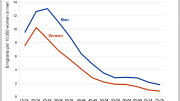
A study by UC San Francisco links higher inflammation levels in young adults—often due to factors like obesity, inactivity, and smoking—to reduced cognitive function in midlife. This relationship suggests that early adult health might influence midlife cognitive skills and the potential development of dementia later in life. Credit: SciTechDaily.com
A UCSF study reveals that higher inflammation levels in young adults are associated with poorer cognitive performance in midlife, underscoring the importance of lifestyle choices in reducing inflammation and preventing cognitive decline.
Higher levels of inflammation in young adults, associated with factors like obesity, physical inactivity, chronic illness, stress, and smoking, are linked to decreased cognitive function in midlife, according to a new study from UC San Francisco.
Researchers previously linked higher inflammation in older adults to dementia, but this is one of the first studies to connect inflammation in early adulthood with lower cognitive abilities in midlife.
“We know from long-term studies that brain changes leading to Alzheimer’s disease and other dementias may take decades to develop,” said first author Amber Bahorik, PhD, of the UCSF Department of Psychiatry and Behavioral Sciences and the Weill Institute for Neurosciences. “We wanted to see if health and lifestyle habits in early adulthood may play a part in cognitive skills in midlife, which in turn may influence the likelihood of dementia in later life.”
In their study, published in Neurology on July 3, researchers found that only 10% of those with low inflammation performed poorly on testing of processing speed and memory, compared to 21% and 19%, respectively, of those with either moderate or higher levels of inflammation.
When researchers adjusted for factors like age, physical activity, and total cholesterol, disparities remained in processing speed; and the researchers also found differences in executive functioning, which includes working memory, problem-solving, and impulse control.
The study followed 2,364 adults in the CARDIA study, which aims to identify the factors in young adulthood that lead to cardiovascular disease two to three decades later.
Participants were 18 to 30 years old when they entered the study and were tested four times over an 18-year period for the inflammatory marker C-reactive protein (CRP). They took the cognitive tests five years after their last CRP measurement, by which time most participants were in their forties and fifties.
About half the participants were female; a little under half were Black, and the rest were white. Some 45% had lower stable inflammation, while 16% had moderate or increasing inflammation; 39% had higher levels.
A link between inflammation and health risks
The researchers also linked higher levels of inflammation with physical inactivity, higher BMI, and current smoking.
“Inflammation plays a significant role in cognitive aging and may begin in early adulthood,” said senior author Kristine Yaffe, MD, a professor of psychiatry and behavioral sciences, neurology, and epidemiology and biostatistics at UCSF. “There is likely a direct and indirect effect of inflammation on cognition.”
Yaffe is a member of the first team of experts to determine that 30% of dementia risk is preventable. Her recent research has looked at the association in midlife between fragmented sleep and lower cognition and the effects of personalized health and lifestyle changes in preventing memory loss in higher-risk older adults.
“Fortunately, there are ways to reduce inflammation – such as by increasing physical activity and quitting smoking – that might be promising paths for prevention,” Yaffe said.
Reference: “Association of Changes in C-Reactive Protein Level Trajectories Through Early Adulthood With Cognitive Function at MidlifeThe CARDIA Study” by Amber L. Bahorik, Tina D. Hoang, David R. Jacobs, Deborah A. Levine and Kristine Yaffe, 3 July 2024, Neurology.
DOI: 10.1212/WNL.0000000000209526
Disclosures: Yaffe reports serving on the Data Safety Monitoring Board for Eli Lilly and several National Institute on Aging sponsored studies, consultation services for Alpha Cognition, serving on the board of directors for Alector Inc., data and safety and monitoring services for Dominantly Inherited Alzheimer Network Trials Unit, and serving on the Beeson Scientific Advisory Board and the Global Council on Brain Health.









I’m amazed to find that these researchers are just now discovering and misinterpreting the links between inflammation, less healthy diet/behaviors and mid-life cognitive decline. In addition to posting numerous comments under similar articles, for years, I’ve previously written other researchers at UCSF and numerous other colleges and universities. Don’t those people share anything? Okay, again for all of you beginners with PhDs, MPHs and MDs, minimally: by 1935 Dr. Arthur F. Coca identified, studied and reported on a (my) kind of nearly subclinical non-IgE-mediated mild inflammation causing food (minimally) allergy reactions (https://www.seleneriverpress.com/historical/nonreaginic-allergy-in-theory-and-practice/) which mainstream medicine still fails to recognize, research, practice and/or teach as true allergies.